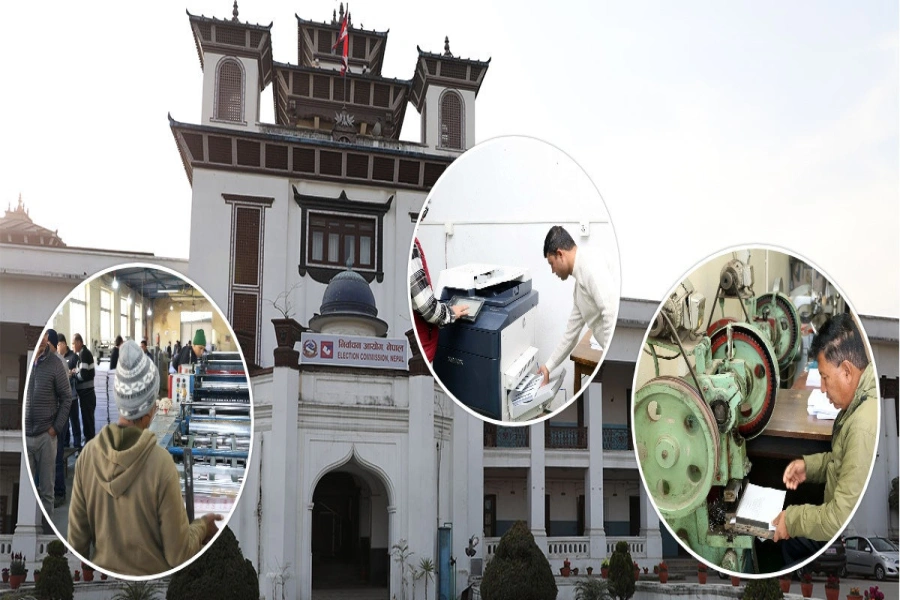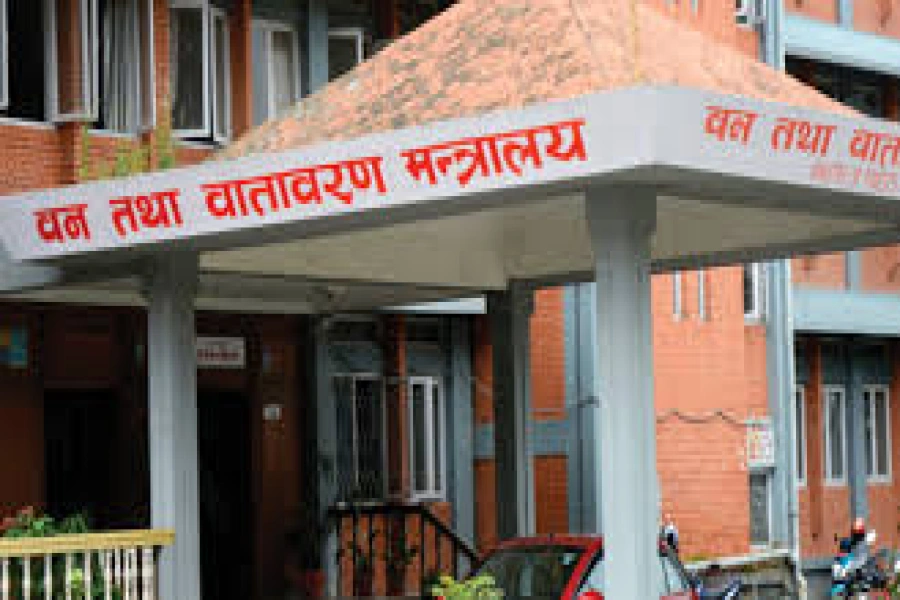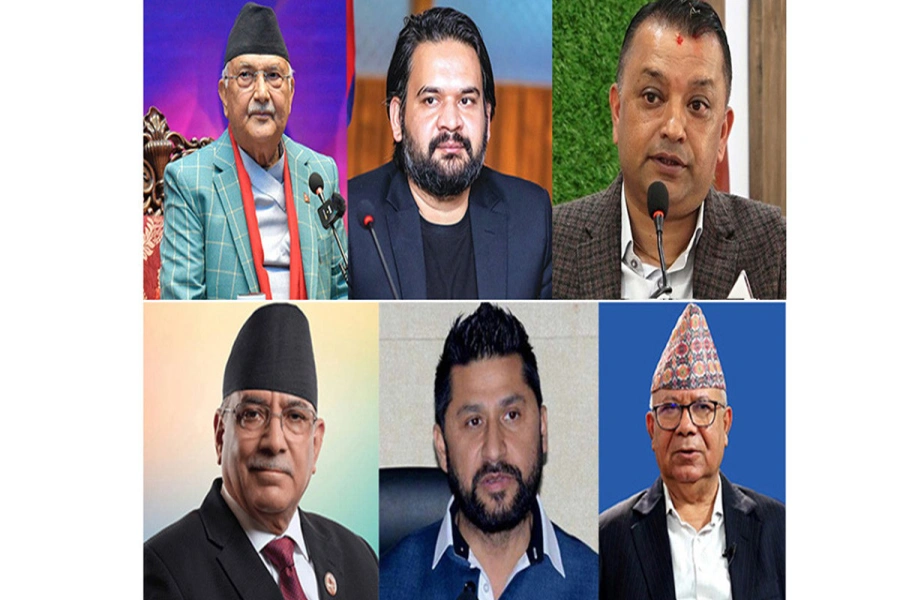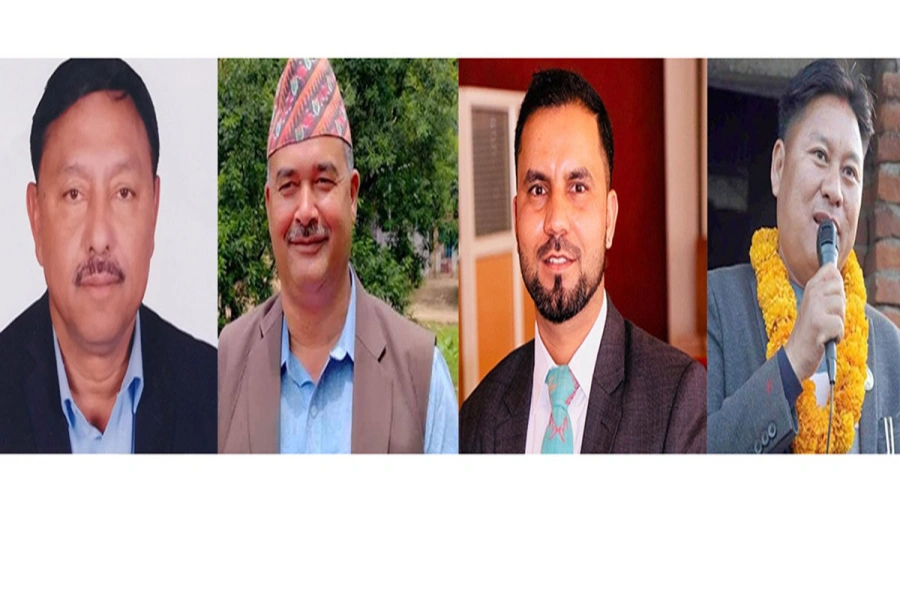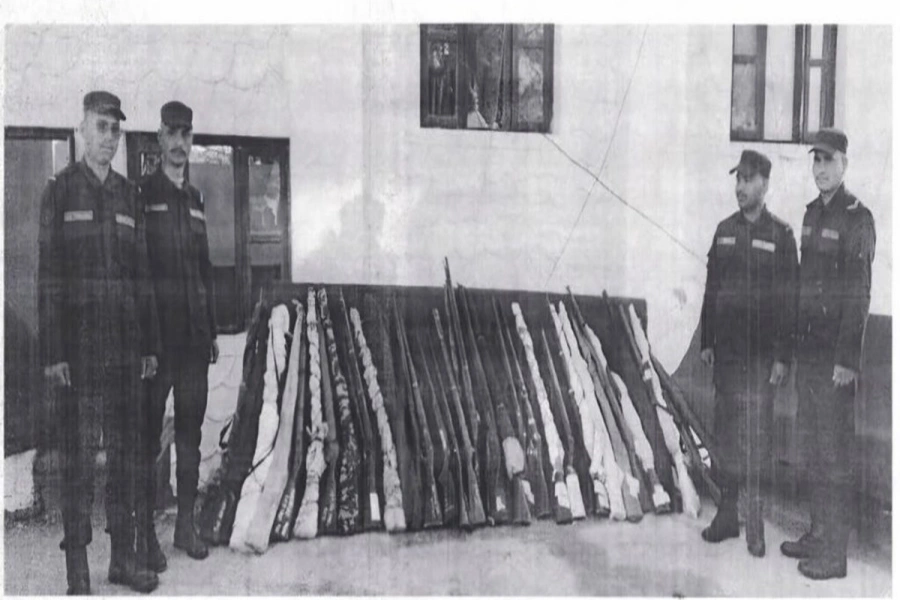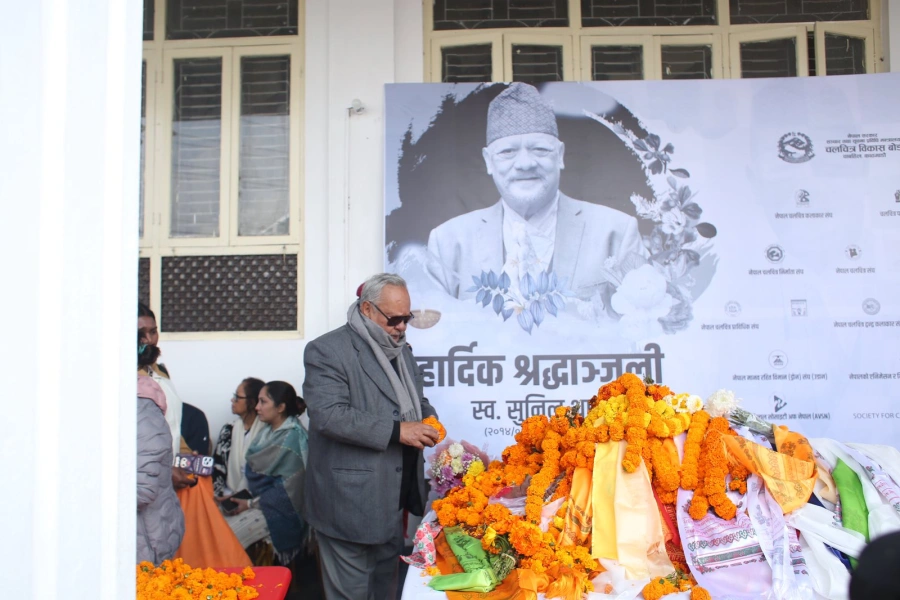As Nepal prepares to bask in the vibrant festivities of Tihar, Newari New Year and Chhath, a stark reality looms, casting a shadow over the joyous occasion. In a nation profoundly rich with natural and cultural heritage, we find ourselves increasingly ensnared by the harsh grip of extreme poverty. Such poverty is glaringly evident in the compulsion of large numbers of Nepali youths to go abroad just for the sake of employment. Even more concerning is that, as artificial intelligence threatens jobs both in Nepal and abroad, countless Nepalese will soon find their livelihoods at risk. Political parties tend to make big promises for socio-economic transformation, only to brazenly renege on them later. Yet, the solution isn’t distant—it lies in plain sight.
Amid this, we can draw inspiration from a pivotal event nearly two decades ago that showcased the potential of an alternative path. Wizards from the psychedelic trance scene set ablaze the wedding of Nepal's most affluent family, mesmerizing guests and propelling the country onto the global psytrance map. This high-profile celebration showcased Nepal’s untapped potential in psytrance festival tourism—a country blessed with awe-inspiring natural beauty, spiritual richness, and a vibrant traditions, all underscored by its status as the birthplace of Buddha. As fate would have it, the high-profile wedding took place on the picturesque beaches of Goa, India—a destination revered as the birthplace of psychedelic trance music. This led many to assume that it was a Psyhead wedding.
Cultural Revolutions in Context
After the wedding, spiritual tourism associated with the psytrance scene surged in Nepal, cultivating a dynamic cultural landscape that attracted visitors from near and far. However, this momentum faced a significant decline in 2016 due to government crackdowns after the communist party's rise to power. Yet, the untapped potential of psytrance festivals—interwoven with adventure tourism and Nepal’s breathtaking natural and spiritual allure—offers the promise of a new rhythm for the country, attracting not just music lovers but seekers of meaning. These festivals, with their unique fusion of music and spirituality, serve as a testament to a broader global movement, yet their decline in a spiritual country like Nepal mirrors the repression of cultural and spiritual expression often seen under communist regimes throughout history. A larger pattern of authoritarian crackdowns, where creative, religious, and spiritual freedoms are systematically curtailed in favor of rigid ideological control.
Interestingly, during Nepal’s Maoist insurgency, psytrance festivals remained largely untouched by both the Maoists and the royal government. This allowed the psytrance scene to flourish, offering a unique space for creative and spiritual expression amidst the turmoil. Unfortunately, many politicians and economists now overlook the crucial role of tourism in this context. By continuing to promote impractical ideas, they are merely peddling snake oil and missing the genuine opportunities that lie ahead.It’s nothing more than vote bank politics.
Prioritize Religious, Spiritual, and Cultural Assets over Labor Export
While politicians and economists argue that competing with the USA, India, and China in AI or software services is a noble goal for Nepal, such ambitions are ultimately misguided. Although a few driven Nepali Individuals or companies might carve out a niche in AI on the global stage, the notion of transforming Nepal into a tech hub akin to Bangalore, Dubai, or Silicon Valley is unrealistic under the current regulatory environment. The political parties overlook the keen insight of the global investment community, which knows that talent and companies ultimately move to well-established innovation hubs, leaving little incentive to invest in regions that lack the necessary infrastructure and support.
In light of these challenges, the government must prioritize tourism. While their theory-based education that rewards memorization might create the illusion that they can replicate the economic miracles of other countries or compete in the AI sector, the reality is starkly different. Although the idea of replicating Singapore’s tactical maneuvers in Nepal may seem compelling in theory or in academic essays, it is ultimately a misguided pursuit. Nepal has immense potential to thrive in spiritual and adventure tourism, yet it continues to send its youth abroad to build other nations. This misplaced strategy of the last decade underscores a significant missed opportunity for Nepal to leverage its unique cultural, spiritual, and natural assets to drive economic growth. One particularly promising area is spiritual tourism, especially the psytrance festivals that Nepal helped nurture in the 1990s.
Economic Impact of the Global Psytrance Festival Scene
The global psytrance festival scene has now grown into a multi-million-dollar phenomenon, with festivals across Europe, South America, Australia, North America, and Asia contributing significantly to local economies. These festivals attract thousands of spiritual people who spend money on accommodation, food, transportation, and other services, boosting local business ecosystems. In a country like Nepal, tourists are not only drawn to the music festivals but often extend their stays to enjoy local food, culture, trekking, hiking, and immersing themselves in the breathtaking natural landscapes or heritage sites in the Kathmandu valley, contributing substantially to the economy.
Moreover, data from leading international psytrance festivals elucidates the substantial economic impact of this sector, demonstrating the festivals' capacity to stimulate tourism and catalyze local economic development.
Boom Festival: Held in Portugal, Boom Festival is one of the largest psytrance festivals globally, attracting over 40,000 attendees. The 2018 edition generated approximately USD 11.8 million in economic contributions, benefiting local hotels, restaurants, and transportation.
Freakonomics: Establishing Nepal as a Global Psychedelic Trance...

Ozora Festival: In Hungary, Ozora Festival gathers around 30,000 attendees annually, with estimated revenue of USD 1.5 million from ticket sales, merchandise, and on-site spending.
Psy-Fi Festival: Attracting 15,000 to 20,000 attendees each year, Psy-Fi generates about USD 5.9 million in revenue, supporting local businesses and the community.
Modem Festival: This smaller Croatian festival hosts 5,000 to 7,000 attendees and generates approximately USD 2.3 million, proving that even smaller festivals can have a significant economic impact.
Universo Paralello: Held every two years on a beach in Bahia, Universo Paralello attracts 20,000 to 30,000 attendees and generates between USD 6 million and USD 8 million.
Nomad Festival: In Chile, Nomad Festival brings in 3,000 to 5,000 attendees and generates around USD 1 million, appealing to eco-conscious travelers.
MonteMapu Festival: Nestled in Argentina, this festival hosts 2,000 to 3,000 attendees and generates an estimated USD 500,000.
Andean Trance Festival: Focused on spiritual experiences, this festival attracts 1,000 to 2,000 attendees and generates around USD 300,000, significantly benefiting local artisans.
Earth Dance: Celebrated globally, Earth Dance draws 5,000 to 7,000 attendees in Brazil, generating about USD 2 million.
Research shows that attendees at European psytrance festivals typically spend between USD 500 to 1,500 per event, highlighting the significant economic impact these gatherings have on local communities as well as the national economy. People are yearning for real-world escapes, drawn to the spiritual richness and natural beauty of countries like Nepal, where such experiences offer a deeper connection to nature and self. This trend is growing worldwide as people find themselves trapped in the never-ending scroll of social media feeds, and Nepal is well-positioned to take a leading role in this movement.
The Economic Potential of Music Festivals in Nepal
The economic potential of psytrance music festivals in Nepal remains largely untapped. Many wonder why Nepal has not been able to replicate the tourism success of countries that have become renowned psytrance hubs in Europe. Despite its stunning landscapes and rich cultural heritage, Nepal struggles to fully harness its potential due to inconsistent infrastructure, political instability, and a lack of a cohesive tourism strategy. The Ministry of Culture, Tourism and Civil Aviation and related agencies have been too traditional in their approach, resulting in Nepal operating at just 5% of its tourism capacity. While the focus has been on trekking, mountain climbing, high end resorts, and heritage sites, the potential for modern spiritual and cultural tourism—like psytrance festivals—has been overlooked.Yet, this is where the true opportunities lie, waiting to be tapped, offering a fresh avenue for global engagement and cultural revival in a way traditional tourism cannot.
One innovative strategy for regulating marijuana in Nepal could mirror casino regulations by allowing only foreigners to purchase it. Designated zones or licensed shops in tourist areas such as Freak Street, Boudha, and Thamel in Kathmandu, as well as Lakeside in Pokhara, could permit sales to people who provide proof of foreign status. Strict penalties for sharing marijuana with locals, combined with regulation and quality control, would ensure safe consumption and reduce illegal trade. Pokhara would be an ideal city to pilot this initiative, given its vibrant tourism scene, stunning natural beauty, and numerous excellent locations for psytrance festivals and meditation camps.
Funky Buddha’s Surprise
In the spring of 2007, Nirvan Chaudhary, heir to the legacy of Nepal's first billionaire, was preparing for his wedding. Celebrations swirled around him, marked by lively pre-wedding parties that set the stage for what was to come. At Babar Mahal Revisited, Dinesh Shrestha organized a performance by the renowned Indian electronica Midival Pundits, whose infectious energy electrified the air for the pre-wedding bash. However, Sunil Gurung, the owner of Funky Buddha, envisioned a pre-wedding party that broke the mold. He orchestrated a lively psychedelic gathering at Lakure Bhanjyang, a stunning location near what is now The Terraces resort.
Gurung expanded the invitations beyond his inner circle and the wedding guests, warmly welcoming the psytrance community to join in the festivities. He offered passes to enthusiastic revelers and organized affordable transportation to the picturesque venue. What started as a pre-wedding celebration blossomed into a communal festival, bringing together friends, music lovers, and the vibrant spirit of the psytrance scene in a shared, unforgettable experience. Many psytrancers from around the world who had visited Nepal that spring also joined in the celebration, creating a lively atmosphere filled with music, dance, and divine connection.
By the time the clock struck midnight, local DJs were unleashing a torrent of hard-hitting psytrance, propelling the dance floor into a blissful frenzy. By 3 AM, an electric buzz spread through the crowd: Growling Mad Scientists (G.M.S.) were on their way to the venue. So deep in the groove, many didn’t even realize when their set had begun—until the unmistakable "At the End of the Rainbow" from the ‘No Rules’ album sliced through the sonic chaos, unleashing a euphoric wave that surged through the crowd. As the pulsing energy intensified, the unmistakable drop of "Juice" ignited a fire within, sending vibrations of pure bliss rippling through every dancer, transcending them into a collective trance where time seemed to dissolve.
Just as the psytrance community in Nepal buzzed with excitement over G.M.S., the duo was equally eager to visit, drawn by the allure of the majestic mountains. G.M.S. held a special place in Nepal's heart, particularly after their feature in the 2003 edition of WAVE magazine's psychedelic trance column, which introduced them to Nepal's broader cultural consciousness.
The legendary Dutch duo G.M.S., consisting of Riktam (Shajahan Matkin) and Bansi (Joseph Quinteros), took the stage from 4 AM to 6 AM, seamlessly blending their signature sounds into a spiritual trance dance that captivated both wedding guests and dedicated psytrance fans. Their pulsating beats and mind-bending melodies created an immersive experience that felt almost ritualistic, sending waves of euphoria and energy through the audience. The dance floor transformed into a sacred space, with each beat guiding participants into a state of rhythmic meditation.
After the dynamic and transcendent performance by G.M.S.,DJ Nishan Manandhar elevated the energy even further with an equally powerful set as the sun rose over Ganesh Mountain, casting a golden glow across the crowd. For many, including tourists, it felt like a once-in-a-lifetime experience. The mix of rhythm, energy, and the breaking dawn created a moment of pure joy, shared by everyone through the power of sound. This year, G.M.S. celebrates a remarkable milestone—their 30th anniversary with a world tour. In this context, Nepal, with its breathtaking landscapes, beckoned as the ideal backdrop for what could have been the most spectacular event of the tour, set against the majestic foothills of Annapurna.
Challenging Conventional Economics
As the world evolves with the rise of AI and robotics, Nepal's reliance on remittances is increasingly inadequate for economic development. To foster resilience and sustainable growth, the government must act decisively to legalize marijuana for tourists, promote psytrance festivals, and revitalize spiritual tourism by 2027. With the threat of widespread unemployment from AI, tapping into the travel and tourism sector—valued at USD 9.9 trillion globally—becomes essential. Establishing a Department of Psytrance Festivals within the Ministry of Tourism could rejuvenate the national rhythm and economy, offering a viable alternative to the brain drain caused by failing government initiatives. Harnessing the power of spirituality, music, culture, and tourism is crucial for creating a brighter future for Nepal's next generation. If establishing a government department appears overly ambitious, the Nepal Tourism Board should consider taking on this challenge instead.
In essence, the principles of Freakonomics must resonate throughout the halls of Singha Durbar. Co-authored by economist Steven D. Levitt and journalist Stephen J. Dubner, the book challenges readers to move beyond traditional economic theories and explore the underlying incentives that drive human behavior. With translations in 35 languages and a substantial run on The New York Times Best Sellers list, Freakonomics has captured global attention.
Steven D. Levitt, the William B. Ogden Distinguished Service Professor of Economics at the University of Chicago, leads the Becker Center on Chicago Price Theory. A Harvard graduate, he earned his BA in 1989 before receiving his PhD from MIT in 1994. Since joining the faculty at the University of Chicago in 1997, Levitt has been instrumental in shaping the thinking of a new generation of economists and policymakers around the globe, encouraging them to embrace innovative, outside-the-box approaches to economic challenges.
2024 Nobel Prize in Economics
Recently, a professor from the University of Chicago shared the 2024 Nobel Prize in Economics with distinguished economists Daron Acemoglu and Simon Johnson from the Massachusetts Institute of Technology. They were recognized for their groundbreaking research on the role of institutions in economic development, underscoring the importance of effective institutions in fostering economic prosperity. This insight is particularly relevant for Nepal as it seeks to unlock its economic potential and break the cycle of poverty, ultimately creating meaningful opportunities for its citizens.
Robinson is the 101st scholar from the University of Chicago to receive a Nobel Prize, with seven faculty members currently holding Nobel laureates in Economics, underscoring the institution's significant contributions to global economic thought. This year’s Nobel Prize in Economics highlights the pressing need for a dedicated government department to promote psytrance festivals as a means of enhancing cultural tourism and stimulating economic development in Nepal. The country requires politicians, bureaucrats, and economists who can attune themselves to the heartbeat of the present—individuals who grasp the pulse of a changing global landscape and can harness the dynamic energy of Nepal’s cultural evolution.
A New Economic Paradigm
Freakonomists represent a new breed of unconventional economists—those who view the economy not as a sterile set of numbers, but as a living, breathing organism infused with the vibrancy of human experience and creativity. Their approach diverges sharply from the lifeless equations of the 19th century, instead embracing the complexities of modern life, where culture, behavior, and unconventional patterns play as significant a role as traditional economic principles.
Tourism is Nepal’s lifeblood, a vital engine propelling economic growth, capable of uniting the nation’s rich cultural heritage, breathtaking landscapes, and profound spiritual allure into a compelling invitation for the world to partake in its splendor.The term "hippie," once emblematic of the 1970s, ushered in a golden era for Nepal's tourism industry. Today, psychedelic trance festivals and spiritual tourism are poised to ignite a similar wave of cultural and economic revitalization.
The University of Chicago proudly holds the record for the highest number of Nobel laureates in economics, reflecting its commitment to rigorous intellectual inquiry in the discipline. In this light, Nepal would be wise to seek the insights of Chicago School Freakonomists rather than settle for the empty promises of the Tankies and Corporate Shills that currently dominate the ruling political parties.
The Nepal Tourism Board must undertake decisive initiatives to breathe new life into the country’s psytrance festival scene. Its current strategy has relied too heavily on traditional methods, yielding lackluster results and maintaining a narrow focus on the already flourishing sectors of tourism. To unlock the full potential of Nepal’s vibrant cultural landscape, a shift toward more innovative and diverse approaches, including out-of-the-box thinking, is essential.
Postscript: This concludes the two-part series delving into Nepal's rich psytrance heritage and its promising potential for economic revitalization. The author contributed a monthly column on psychedelic trance music to WAVE magazine in 2003 while serving at the Ministry of Science and Technology.



